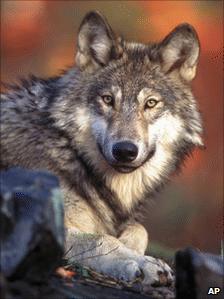Judge orders US to keep protecting 'endangered' wolves
- Published

The grey wolf was nearly hunted to extinction in the US by the 1930s
A federal judge has ordered the US to put Rocky Mountain grey wolves back on a list of protected endangered species.
Encouraged by the recovery of the once nearly-extinct wolf, the US last year moved to allow wolf hunts in two states while protecting them in a third.
But a judge ruled the law did not permit the US to protect part of a species population while allowing hunting of the rest.
Despite the ruling, Idaho said it would seek federal approval for a wolf hunt.
The decision puts wolves in the states of Montana and Idaho back on the endangered species list following their removal last year.
Wyoming's wolves had remained protected because the US government was unsatisfied with the state's wolf protection plan.
In Montana, US District Judge Donald Molloy came down on the side of a coalition of conservation groups who had challenged the US Fish and Wildlife Service's move, external to take the grey wolf off the endangered species list in Montana and Idaho.
Among several arguments, the coalition said the law did not permit the Fish and Wildlife Service to "partially delist" protected species - protecting the wolf in one state but not others.
Significant protection
"The plain language of the Endangered Species Act does not allow the agency to divide a [population segment] into a smaller taxonomy," Judge Molloy wrote.
Grey wolves were once abundant in the US, but a government-sponsored hunting programme nearly eradicated them. The wolves were gone from Montana, Idaho, Wyoming and south-western Canada by the 1930s.
The US passed the Endangered Species Act in 1973 and the wolf was listed as endangered in 1974, affording it significant protection from hunters.
In the 1990s, the government reintroduced wild wolf populations into the northern Rocky Mountains, situated in the western US.
Powerful ranching interests in the states concerned have opposed protection of the wolves, saying they threaten livestock.